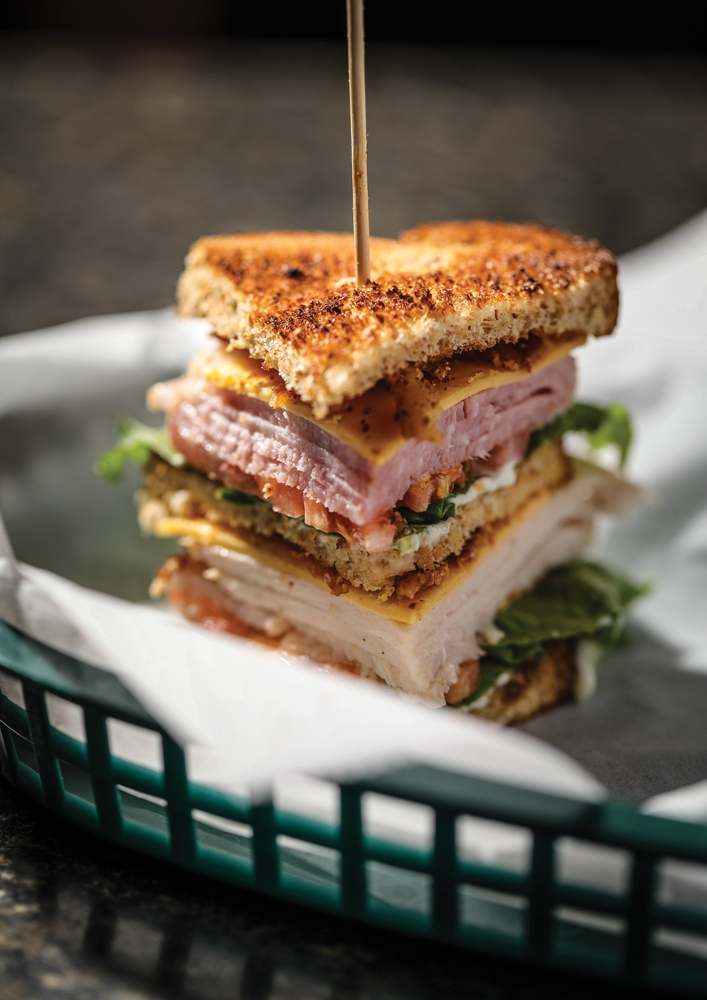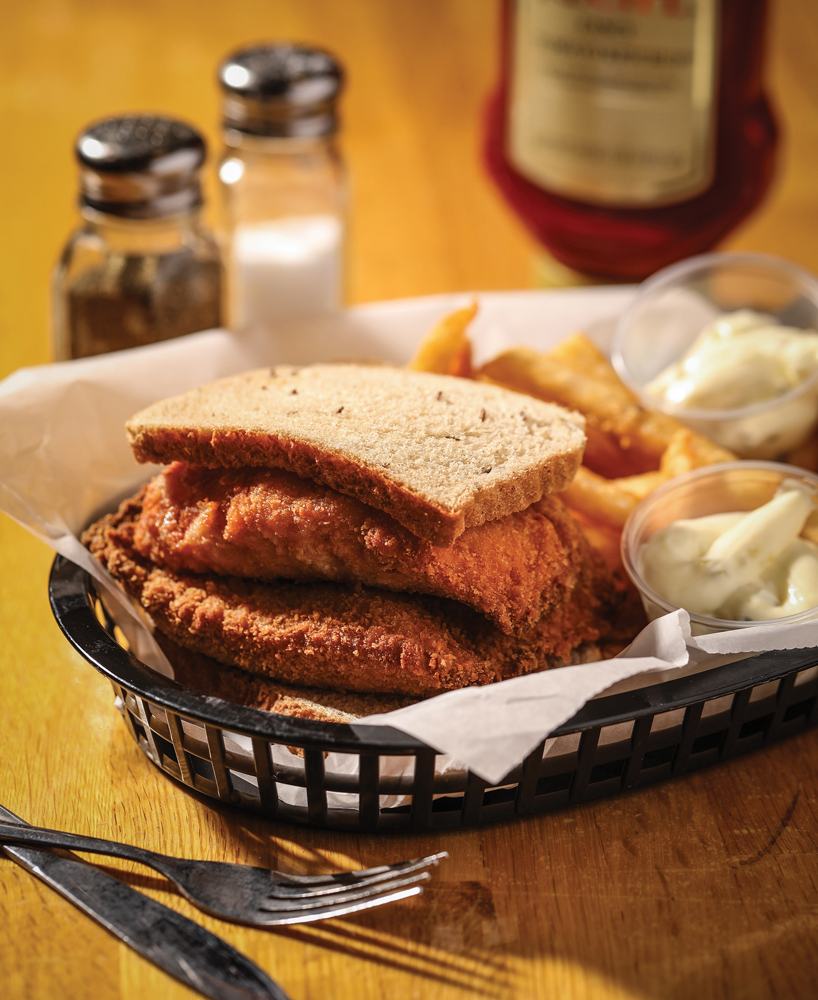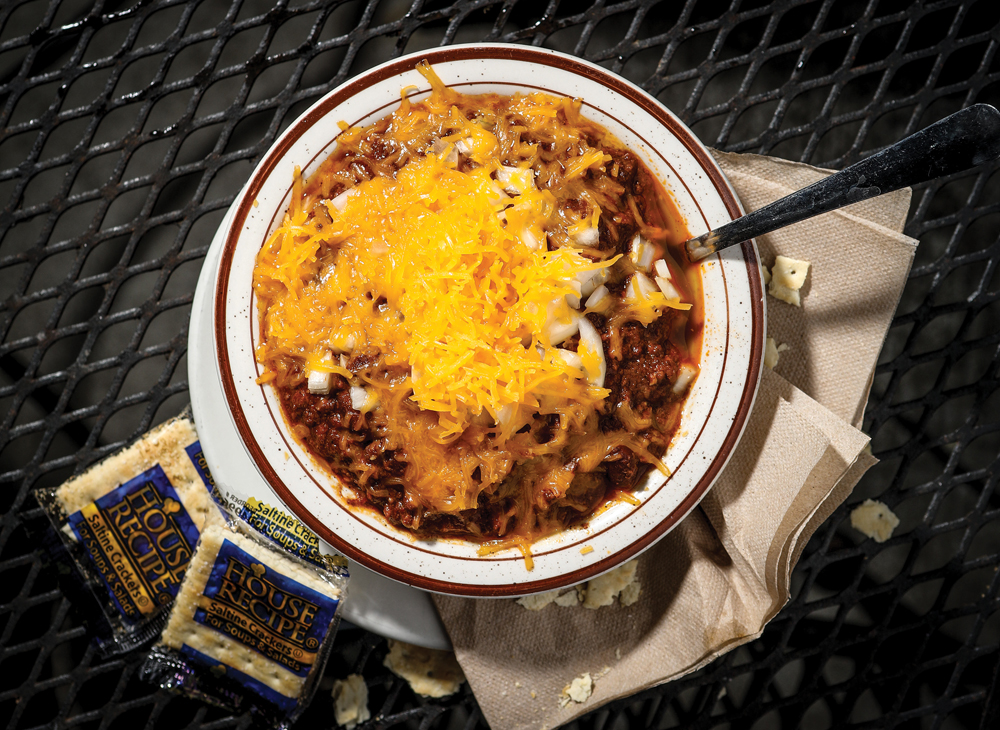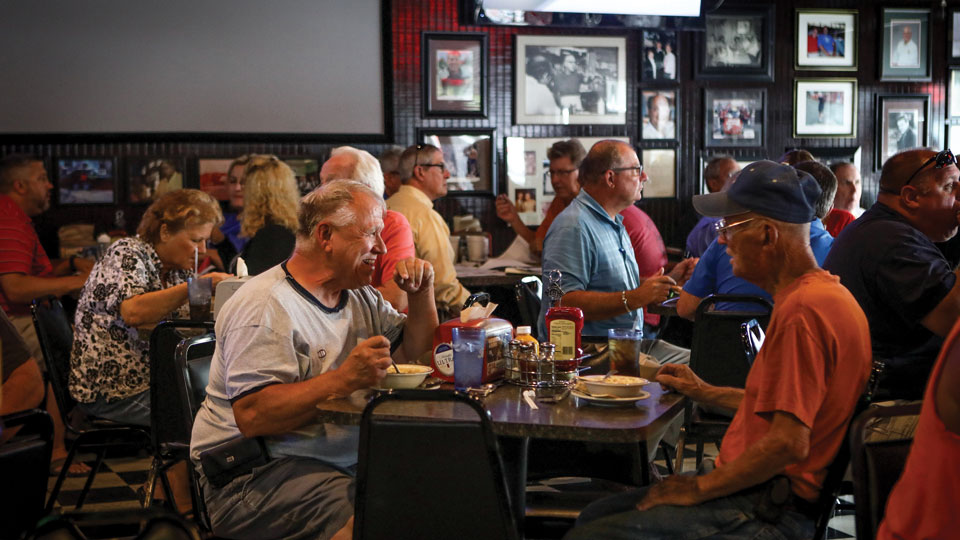What gives this staple its staying power?
Photos by Jessica Ebelhar
At 1 p.m. on an early-summer afternoon, few seats are unoccupied in the Check’s Cafe dining room. There are zero vacant barstools in the Schnitzelburg restaurant, just a small gap at the end of the bar where the two registers sit underneath a flat-screen TV displaying the menu: chicken salad sandwiches ($4.25), a storied bean soup ($3.25), deep-fried chicken wings (10 for $6.25). But even the end of the bar is filled with bodies, a line of people three or four deep, waiting to order lunch — or their second Bud Light. The waitstaff maneuver over the black-and-white checkered floor, yelling names and orders over the clatter of the crowd, carrying parchment-paper-lined red plastic baskets filled with sandwiches and fries. A large-screen TV plays golf, sound muted. A waitress arrives at a packed table of four, delivering what looks like four whole fried chickens.

Photo: Check's Cafe // Jessica Ebelhar
Across East Burnett Avenue from Check’s, signs promise the second location of the Derby City Chop Shop barbershop. Catty-corner, Monnik Beer Co. has established itself as one of the city’s most popular breweries in the two years it has been open. (Check’s regulars remember Heitzman’s and Zeppelin Cafe, both of which once occupied the Monnik building.) Two blocks away, Lydia House has taken over what used to be Flabby’s, a former neighborhood staple. Germantown Cafe is now Four Pegs. Pauly’s Schnitzelburg Pub is now the Pearl. “It was getting to the point where we were the only ones around,” says John Murrow, the owner and operator of Check’s. “It’s nice to have lots.”
In a neighborhood of rapid change, Check’s Cafe remains largely the same: dark wood paneling, framed black-and-white photographs on the walls, neon beer advertisements in the front windows. The brass plate on the front door has a smattered patina from decades of use. No reclaimed wood or geometric light fixtures in sight. Renovations a few years ago were practical: Remove the cramped, single-commode bathrooms and add more stalls, and knock down a barrier wall to open up the dining room. “A spruce-up,” is what Murrow calls it, but otherwise much the same. “If you walk up the back stairs, they haven’t been touched since — probably never been touched,” Murrow says. “When we did the remodel, we tried to simulate what it had always been and not change it.”

Photo: Club sandwich. // Jessica Ebelhar
Murrow and I meet on a Friday morning, about an hour before the restaurant opens. His young son carries a register tray to the second-floor bar. Bartenders and waitstaff count change and wipe tables. It’s strange seeing Check’s so empty. Murrow, now in his late 30s, took over the operation from his father “around 2005” — he’s not sure of the specific date. He owns property in the neighborhood, including renovated houses, Derby City Chop Shop’s new spot and the empty plot behind Check’s, which he plans to turn into a modern office building for his wife’s chiropractic practice.
A sign affixed to the roof bears a picture of original owner Joe Murrow, John Murrow’s grandfather, who died in 1981, a year after John was born. “It says, ‘A Neighborhood Tradition, Established 1944,’” John Murrow says. “Everything has that 1944 sticker on it, but it’s not actually correct. The business was actually open in 1939. At that time, it was just a bar, like an old-style spittoon type. Cup of whiskey and some beers and that’s it.” Murrow’s grandfather purchased the bar in 1943.
Joe’s portrait hangs behind the cramped and crowded bar. “Everybody that I’ve ever talked to tells me basically the same story about my grandpa, about coming in the first time they met him,” Murrow says. “They didn’t come back for a while and as soon as they walked through the door, he remembered their name. Of course, my grandmother said, ‘He used to kick me and ask me what the name was.’”

Photo: A portrait of Joe Murrow hangs behind the bar at Check's. // Jessica Ebelhar
Murrow says that, in the 1950s or ’60s, his grandmother’s recipes were added to the menu and, like the decor, they’ve hardly changed. In its heyday, Check’s would close for only two hours, between 4 a.m. and 6 a.m. Billy Reynolds, a bartender, has been working at Check’s since 1994, but he first came in as a customer when he was 18. Joe Murrow served him a beer. When Reynolds came back a few years later on his 21st birthday, Joe simply said, “Oh, you’re 21 now?” and gave him another beer.
Check’s established itself as a place for family long ago. Murrow believes this is the main reason for the restaurant’s staying power. He hears the same story from patrons: They first came to Check’s with their parents, and then they grew up and took their kids, who, in some cases, are now taking their kids. “I always say in the restaurant business I kind of have it easy because most of the people I deal with have been here before,” Murrow says. “They’ve already made their mind up. They’re saying, ‘Let’s go to Check’s.’”

Photo: Longtime bartender Billy Reynolds (left) with owner John Murrow. // Jessica Ebelhar
“I grew up probably six blocks from here on Ellison,” longtime regular Ed Martin says. He has been coming to Check’s for more than 50 years. He sometimes sits at the bar during the Wednesday trivia nights, guessing answers with friends. He meets some high school classmates at Check’s on Monday nights. Today, Bud Light in hand, he is eating lunch with his son. “This is actually Schnitzelburg. There’s a big difference,” he says. “My father wouldn’t come to Schnitzelburg to drink. We had a bar 100 feet from my house (in Germantown).”
Martin remembers carting buckets of beer from Check’s and other local bars back to his house as a kid. “We called them growlers,” he says, a practice that Murrow says continued into the 1970s. Martin remembers after-work meetings, when Joe would hand out complimentary beers from the Falls City delivery truck. “It’s tradition,” Martin says. “You can mention Check’s to a family that grew up somewhere within a mile of here, and they know instantly. They’ll tell you the last time they were in there.”

Photo: Fish sandwich // Jessica Ebelhar
In the half-century that Martin has been coming to Check’s, he can recall only a single “incident,” if you can even call it that. Reynolds, the bartender, immediately showed the door to someone who had been told not to come back. “As far as people drinking, which is a lot, nobody fights here,” Martin says. He tells me that the most heated arguments at Check’s are over sports teams.
“I think everybody’s into this trendy stuff now,” Murrow says. “There’s five million ways to do a burger now, eight different types of burger meats. We still do simple, home-cooked-type meals.” Large cod fillets ($7.50) nestle into slices of rye bread, a heaping portion that could make two sandwiches. (“Believe it or not, the fish is as good as any fish in Louisville,” Martin says.) The “famous” — everybody uses that word — Check’s chili ($4.85) is a red Texas-style, with beans and meat heaping inside a bowl with or without noodles, topped with onions, smashed saltines and an oozing shredded Cheddar that melts everything together.

Photo: The "famous" Check's chili. // Jessica Ebelhar
“Check’s has not only survived, it’s gotten gigantic,” Martin says at the end of the lunch hour, the dining floor still half-full, the bar still entirely full. “I can tell you how many new people are here, because I used to come here and I’d know maybe one out of five, especially around the bar. I come in here sometimes (now) and I might not even know five people.”
This originally appeared in the August 2017 issue of Louisville Magazine. To subscribe to Louisville Magazine, click here. To find your very own copy of Louisville Magazine, click here.



